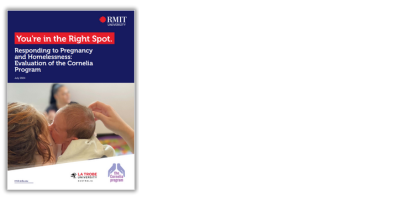
An independent evaluation has shown: the Cornelia program works. The comprehensive review was conducted by RMIT University and La Trobe University over a two-year period and completed in 2024.
Titled “You're in the Right Spot. Responding to Pregnancy and Homelessness”, the evaluation report says the innovative pilot program provides life-changing outcomes.
Associate Professor Juliet Watson from the School of Global, Urban and Social Studies at RMIT, led the evaluation.
She said that Cornelia is a unique and valuable service supporting pregnant women facing homelessness.
“We followed many of the women from when they joined the program to six months after they moved into their own homes,” A/Prof Watson says.
"It was great to see these caring and eager mothers thriving in their new homes and enjoying time with their babies."
The Cornelia program is an Australian-first early intervention pilot, launched in 2021.
It was designed in response to a service gap for women and gender diverse people experiencing pregnancy and homelessness.
The program is a partnership between the Women’s, Housing First, and Launch Housing. It is currently funded by the Victorian State Government and philanthropic partners.
Program manager Sally Coutts says Cornelia gives women a vital chance to end the cycle of disadvantage and trauma.
“The initiative ensures that some of society’s most vulnerable receive essential support,” Ms Coutts says.
“Cornelia’s holistic model addresses a broad range of needs. This includes antenatal care, mental health support, and help with family violence. It also covers parenting education and cultural services.
“Women benefit long-term from this approach. They have gained more independence, lived without violence, built stronger bonds with their babies, and begun their recovery from trauma,” Ms Coutts says.
The statistics highlight the need for the program. As of February 2024, 89 women had entered the Cornelia program, with 79 babies born. Almost 30 per cent of these newborns required admission to the Women’s Newborn Intensive Care Unit (NICU).
Forty-one 41 per cent of women participating in the program were born overseas and 14 per cent identified as Aboriginal. An overwhelming 92 per cent reported a history of mental ill health. Additionally, 84 per cent had experienced family violence before entering the program.
Better outcomes for women
The evaluation found the Cornelia Program is achieving outstanding longer-term results.
- Seventy per cent of women and their babies moved into long-term housing after leaving Cornelia.
- Independent housing is providing women with protection from perpetrators and creates conditions that can facilitate leaving violent relationships.
- Women are reporting significantly increased levels of self-confidence and independence.
- The program is improving women’s relationships with their babies and reducing the likelihood of repeat Child Protection notifications and/or ongoing involvement post-birth.
- Some women entered paid employment or education after leaving the program.
Laura Mahoney is the Executive Director of Homelessness Solutions and Impact at Launch Housing. She is proud of this program that demonstrates the power of cross-sector partnerships.
“Cornelia offers a critical intervention for women experiencing pregnancy and homelessness who would otherwise have few specialised housing and support options,” Ms Mahoney says.
“The program is breaking the cycle of homelessness and helping to create strong, loving bonds between mothers and their babies.”
Learn more on the Cornelia program and read the full evaluation report:
You're in the right spot: Evaluation of the Cornelia Program Report
